BigCommerce Reviews 2024 | Everything You Need to Know
Best ecommerce builder for large and fast-growing businesses.
Our independent research projects and impartial reviews are funded in part by affiliate commissions, at no extra cost to our readers. Learn more
Best for
Best for a Purely Online Business
What Are the Pros and Cons of BigCommerce?
Pros
- No platform fees/commission on any plan (unlike Shopify)
- Great in-built, user-centric (free) features, which stops the price quickly escalating
- Smooth multi-channel integration. If you’re already selling across marketplaces or social media, BigCommerce is a natural next step
- Strong SEO support for organic growth
Cons
- Not as easy to set up – our users found some things difficult to locate and/or understand. It’s not a ‘quick ecommerce fix’, but is doable with some time and patience.
- Revenue-led billing may disadvantage stores with very tight margins
BigCommerce is great for…
- New, ambitious ecommerce stores. BigCommerce is super scalable – while plans start at just $29, the top plans are capable of supporting the likes of Ben and Jerry’s, Toyota, and Kodak.
- Stores which sell through other platforms (e.g. Instagram, Etsy, eBay) as well as through your own store. If you already have a strong presence on other platforms, BigCommerce is a natural choice.
- Well-established ecommerce stores which have outgrown their current platform. As above – you won’t outgrow BigCommerce, and it also has a range of helpful tools and guides for a smooth migration.
We wouldn’t recommend BigCommerce for…
- Small-scale selling. If you just have a few products to sell, there’s no problem with using BigCommerce, but you’ll be sacrificing ease of use for features you won’t be getting the most out of (kind of like why you wouldn’t carve a turkey with a chainsaw). Try Wix instead.
- A quick/easy setup. If this is a priority for you, check out Shopify instead – it was better-rated in user testing, but you will incur additional transaction fees (unless you use Shopify Payments as your payment gateway).
BigCommerce Video Review
Would you prefer a video review? We know reading a whole review can take a while, so to save you time and effort we put together this BigCommerce video review. Sit back and relax as we talk you through features, ease of use, pricing, design, and more, to help show you whether BigCommerce is the right choice for you:
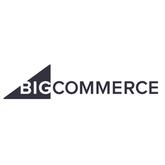
User Reviews
Our independent research process determines how we rate and review BigCommerce. Here’s an overview of how it scored:
As part of our research, we get real people to build a store with BigCommerce to a set brief, with a time limit. Afterwards, we interview them about their experience.
Here are a few quotes about BigCommerce:
“Yes it’s difficult, yes it’s not overly easy to use, but you can see why – it’s because it’s basically there to run your business for you. But creating a website was not the easiest of experiences.”
“Everything was where it should be, but there were just so many options that trying to find the one you want just takes a while longer, that’s all.”
“Being able to comfortably create a brand by using this website builder is more or less redundant unless you are willing to spend a huge amount of time learning how to customize the already created themes. I would just simply give up because I don’t have time to offer.”
Safe to say, it was a mixed bag. Common themes included:
- Recognizing that BigCommerce had a lot to offer, but not being totally sure on how to make the most of it
- Finding customization of themes difficult beyond the more superficial stuff, although this is an area we’ve noticed BigCommerce really trying to improve
After testing the platform for an hour, only 56% of our users would recommend it – that’s versus 88% for Shopify and 72% for Wix.
Pricing, Fees and Payment Processing
BigCommerce has an unusual approach to plans, in that the plan your business will be on is determined for you. It’s all linked to your business’s revenue:
BigCommerce Plan Pricing: At a Glance
| Price per month (billed monthly) | Price per month (billed annually) | Revenue bracket (previous 12 months) | BigCommerce fees | |
|---|---|---|---|---|
| Standard | $39 | $29 | $0 - $50k | 0% |
| Plus | $105 | $79 | $50k - $180k | 0% |
| Pro | $399 | $299 | $180k - $400k | 0% |
| Enterprise | Custom | Custom | $400k+ | 0% |
You can, however, upgrade to a higher plan than your revenue bracket to access more features. We’ll break down each plan in more detail below, which will help you see when this will be worthwhile.
BigCommerce Plan Pricing: Breakdown
| Plan | Features | Our Verdict |
| Standard | •Unlimited number of products to sell •Unlimited staff accounts •Multiple sales channels, including eBay, Amazon, Facebook, and Google Shopping •Coupons, discounts, and gift cards •Real time shipping quotes •Product ratings and reviews | A good, budget starting point, but lacking some important features for scaling – namely abandoned cart recovery (which Shopify includes on its cheapest plan) |
| Plus (our top choice*) | Standard plan features, and: •Abandoned Cart Recovery •Customer groups to reward frequent shoppers •Store credit cards | Strikes the perfect balance – great features at a reasonable price. Worth upgrading to this plan even if you’re under the revenue threshold |
| Pro | Plus plan features, and: •Google customer reviews •Product search filtering •Custom SSL (Secure Sockets Layer) | A logical step up for ecommerce businesses with a growing inventory. Product filtering will greatly improve the user experience |
| Enterprise | Pro plan features, and: •Priority support •API support •Custom facets (product filtering) •Price lists | Worth it for the largest businesses, but don’t rush to upgrade otherwise. You can pay to upgrade your revenue limit on the Pro plan instead |
* Why do we recommend the Plus plan, even for lower-revenue ecommerce businesses?
Three words: Abandoned. Cart. Recovery. The average cart abandonment rate across all industries is 69.57%, and tailored, automated abandoned cart emails are a proven and powerful way to recoup some of this lost potential. If your average order value is $25, then you only need to successfully reengage two customers per month for this plan to more than pay for itself.
BigCommerce Pricing vs Competitor Pricing
This pricing lines up pretty evenly with Shopify’s, which has plans costing $29/month, $79/month, and $299/month. But BigCommerce’s lack of transaction fees gives it a real edge in terms of overall cost:
Annual Cost of Using Shopify
| Annual Revenue | Shopify Fees* (%) | Shopify Fees ($) | Plan Cost (monthly) | Plan cost (for one year) | Total Shopify Cost (annual) |
|---|---|---|---|---|---|
| $40,000 | 2% | $800 | $29 | $348 | $1,148 |
| $100,000 | 1% | $1,000 | $79 | $948 | $1,948 |
| $200,000 | 0.5% | $1,000 | $299 | $3,588 | $4,588 |
* It’s worth noting that you can avoid these extra Shopify fees by using Shopify Payments, but this wouldn’t typically be most merchants’ first choice (as it won’t be as well-known for customers).
Annual Cost of Using BigCommerce
| Annual Revenue | BigCommerce Fees (%) | BigCommerce Fees ($) | Plan Cost (monthly) | Plan Cost (for one year) | Total BigCommerce Cost (annual) |
|---|---|---|---|---|---|
| $40,000 | 0% | $0 | $29 | $348 | $348 |
| $100,000 | 0% | $0 | $79 | $948 | $948 |
| $200,000 | 0% | $0 | $299 | $3,588 | $3,588 |
This is an approximation (there are some other considerations, which we’ll expand on below), but it just goes to show the huge impact that transaction fees can have, which is easy to overlook.
Payment Options
BigCommerce itself doesn’t charge any transaction fees, but you will incur the usual credit charges from your payment gateway (this is true of all ecommerce platforms).
You’ve got over 65 integrated payment gateways to choose from. With one-click setup, mobile payments, and multiple currencies supported, BigCommerce does its best to get you paid fast. Payment providers include:
- PayPal
- Stripe
- Square
- Apple Pay
- Amazon Pay
- Adyen
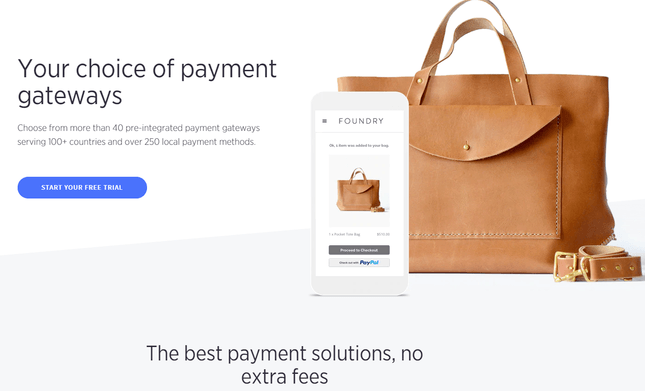
Payment Processing Fees
The longer you stay with BigCommerce and upgrade through its price plans, the lower your rates will go – in fact, they can drop from 2.9% all the way down to 2.2%, or sometimes even lower:
- BigCommerce Standard plan: 2.9% + 30c
- BigCommerce Plus: 2.5% + 30c
- BigCommerce Pro: 2.2% + 30c
- BigCommerce Enterprise: >2.2% + 30c (negotiable)
Shopify’s payment processing fees line up pretty evenly with BigCommerce’s, ranging from 2.9% + 30c to 2.4% + 30c. BigCommerce has a slight edge for high-volume merchants.
Optional Extra Costs
Theme: Free – $300 (one-off payment)
Apps: Free – ~$350/month (most paid ones in the $3 – $20/month bracket)
We’ll expand on both themes and apps in the sections below, but just wanted to give you a heads up about the cost early on.

Further Information
Want to know more about BigCommerce’s pricing plans? Read our BigCommerce Pricing Review to find out which plan is right for you.
Products and Inventory Management
We’ve already touched on how our users didn’t find BigCommerce the easiest platform when it came to designing and setting up their website. But let’s take a closer look under the hood – what types of products can you sell with BigCommerce? How easy is it to upload them? And can you sell through other channels?
Product Types
BigCommerce is the only ecommerce builder on the market which lets you sell physical, digital, and service-based products without having to use an app (often at an extra cost). All of these sales types are already built into the editor. This means less hassle and less cost, because you don’t have to worry about using third party apps.
One thing that does require an app, however, is subscriptions/recurring billing. There’s a choice of free and paid apps to add this functionality.
Product Variants and Categories
BigCommerce makes adding product variants more simple than comparable platforms. This will be music to the ears of anyone selling multiple versions of one product, such as clothing brands:
We love how BigCommerce auto-generates SKUs for all the different combinations of variants, too.
Multi-Channel Selling
If you’re already selling on other marketplaces, or plan to be, BigCommerce has features to support you.
With Facebook, Amazon and eBay integrations, not only will your inventory sync up across all platforms, but your product listings will, too. So, for example, if you adjust a product title in the backend of your site, the change will carry across all platforms, cutting out a lot of manual work.
And with Instagram, you can smooth out the user journey by displaying up to five products with detailed product views on your account.
BigCommerce even lets merchants sell directly on Walmart Marketplace, with an expedited application review that means you can get started as quickly as possible.

BigCommerce Sales Tools and Features
BigCommerce has the best in-house features of any ecommerce builder. These provide a high level of quality and reduce the reliance you may have on third party apps. You effectively have everything you need right at your fingertips, and for no extra cost.
Abandoned Cart Recovery
When a customer enters their email and then abandons their products in the shopping cart at checkout, you can send an automated email to draw them back to their purchase. You can even personalize the emails and include discount codes.
This is a real money saver! On average, these emails win back 12-15% of customers, while personalized emails are six times more effective than regular ones.
The only downside is that this feature isn’t provided on BigCommerce’s cheapest plan (whereas it is on Shopify’s cheapest plan). As you can see, it’s a really valuable tool to have, which is why we recommend the Plus plan as a minimum.
POS Integrations
One area BigCommerce does really well is syncing online and offline payments. Some ecommerce platforms/website builders don’t really offer this at all (Squarespace has only recently partnered with Square to offer this), while others are more limited in general.
BigCommerce has more POS integrations than other ecommerce platforms, including:
- Clover
- Square
- Epos Now
- Vend
- iZettle
- Hike
If you sell a lot in person, or have a physical store, BigCommerce will help keep your inventory synced and your finances centralised.
Extra Apps
These are just a few of the essential features BigCommerce has. If you do want to expand your site beyond these functions, you can – you’ve still got over 600 apps to choose from in the BigCommerce app store, and will benefit from the staggering 400 API calls per second the platform is able to handle.
BigCommerce has a much more limited app store than its competitors. But that’s only because it has so many impressive in-house features already! You just don’t need as many apps as you would with Shopify, for example. This keeps costs lower, because you don’t have to pay out for third party add-ons every month.
Shipping Options
BigCommerce gives you a range of shipping options. You can get real-time shipping quotes, offer free shipping to your customers, and print shipping labels, all with BigCommerce’s third-party integrations.
BigCommerce now offers its own all-in-one service for next-level shipping tools. Simply install the new BigCommerce Shipping app for free, and enjoy special discounts (up to 80% off!) with USPS, DHL, and FedEx.
Keep your customers happy with shipment tracking, in-store pickup, and next day delivery, and make your own life easier by automating your shipping operations.
BigCommerce Shipping comes with tons of perks, but the main one is that you can easily manage all your shipping from one central hub. Shipping can be a challenge, but BigCommerce aims to give you powerful tools with minimum fuss.

Themes and Design
Your online store needs all the latest sales tools to stay ahead of the competition. But when it comes to standing out from the crowd, the first thing your visitors will notice is your website’s design.
BigCommerce has over 100 themes on offer. There are 15 free themes and over 100 paid themes, which range from $150-$300. That’s a lot of themes to choose from!
Luckily, BigCommerce makes it really easy to find your perfect theme. You can search by industry, or by the layout you want for your template. For example you can choose from grid layouts or designs featuring large images. You can also view just free or paid themes, or use the search bar to find tailored results.
Themes really vary depending on the industry they are categorized under. For example, themes in the ‘Fashion & Jewelry’ category have a product zoom feature, while other categories don’t include this. So it’s worth having a proper search to find a theme that best fits your store’s needs.
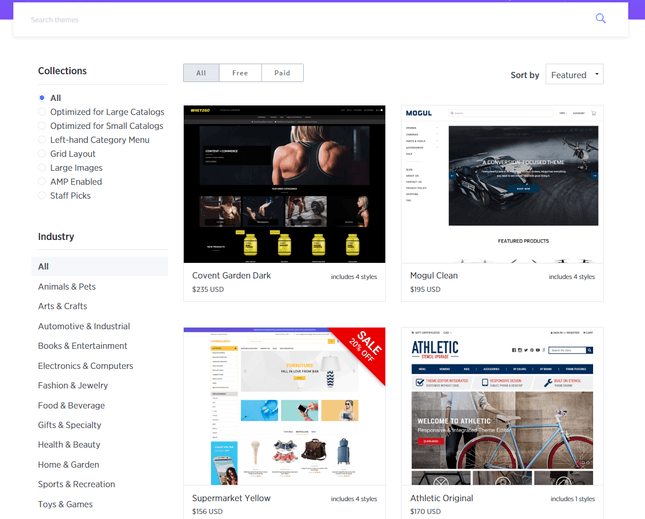
You can preview a theme before you select it, which is a really useful option. If you do pick a theme and then change your mind, don’t worry! You can switch your template any time you like.
All BigCommerce themes are fully mobile responsive. You can’t edit the mobile view, because the theme automatically reformats to fit mobile screens. This means you don’t have to spend a second worrying about losing out on mobile shoppers. With over 50% of traffic coming from mobile devices, this is an essential feature to have!
Design Customization
The real question is, how customizable are BigCommerce’s themes? It’s a question with an exciting answer.
BigCommerce recently released a new visual merchandising tool, called Store Design. Whereas before you had to customize your storefront in two separate areas and wait to see the results, this tool changes everything!
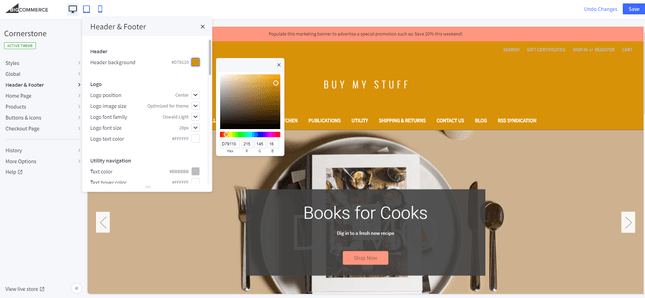
The Store Design tool allows you to pick out sections of your page and customize them there and then, right in front of you. This gives you instant control over everything from background colors to logo positions, number of featured products, navigation arrow colors, and more.
This new tool brings a much higher level of customization to BigCommerce’s themes than ever before.

Further Information
Discover the Best BigCommerce Themes in our handpicked shortlist of the 14 best BigCommerce designs!
Check out BigCommerce vs Squarespace to see how BigCommerce’s themes compare to the industry’s best-designed templates.
Ease of Use
BigCommerce scored 3.3/5 stars for ease of use, with people finding it 14% more difficult to use than Shopify.
But why?
The main reason people struggled with BigCommerce was its design interface. When you’re creating your store, it’s split between two areas. One is where you add products and manage the “behind the scenes” parts of your store – for example, discounts and shipping – while the other is where you edit your storefront.
To combat this, we recommend setting up the inventory section of your store first. Upload all your products, add items such as discounts, then go to the storefront editor to personalize your storefront.
This is something BigCommerce does seem to be trying to tackle. The (relatively) new visual merchandising tool Store Design means you can see the effects of your edits, and makes BigCommerce more customizable.
Remember, BigCommerce is an ecommerce builder designed to carry stores into big business. Think of it like a jumbo jet: it’s got all the powerful tools necessary to take your online store on a long-haul flight, without you having to change planes halfway through. However, you won’t be able to fly it straight after passing your pilot’s exam!
With great power comes great complexity, and BigCommerce isn’t ideal for anyone who’s not tech savvy. However, the recent release of the Store Design tool is a great step. It shows BigCommerce is listening to its users’ feedback, and is making its builder easier to use.
Help and Support
When you’re making money through your website, any problems can be costly. Fortunately, BigCommerce has help options in place to get you sorted quickly and easily.
The help and support channels available depend on what price plan you’re on. As standard, BigCommerce provides 24/7 phone and live chat support. No need to stress out at 4am, counting down the hours until 9am; simply pick up the phone or open up a live chat to get your problem dealt with by morning.
There’s also email support. In fact, when you sign up for a free trial, you get an email through offering an appointment for a 10 minute call to discuss your business, its goals, and how BigCommerce can help you succeed.
In addition to phone, live chat, and email, you can also make use of video tutorials – and even better, the BigCommerce Help Center.
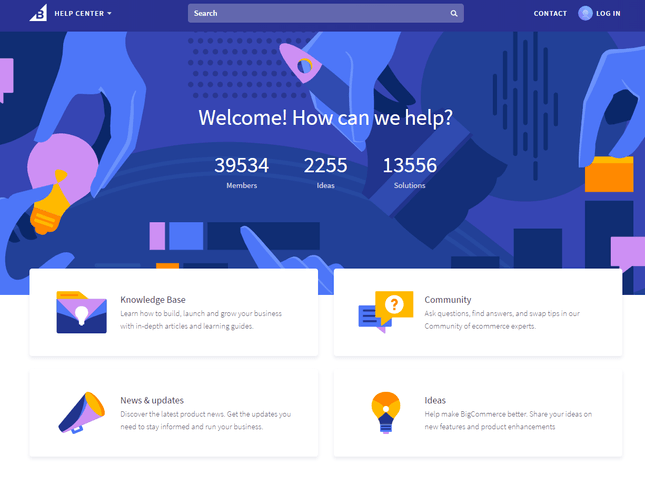
If you’re on the most expensive Enterprise plan, you unlock priority support. This includes an onboarding consultant, as well as prioritized phone calls. With instant connections to the most senior and highly-trained support staff, this provides the highest level of quality support for your store.
BigCommerce Review: The Verdict
BigCommerce is a top ecommerce builder with a lot of weight behind it. It came third overall in our ecommerce builder research. Impressive data reports, an extensive inventory, and the most built-in features of any builder make it a force to be reckoned with.
It’s perfect for large and fast-growing businesses. If you’re not looking for growth, or are a total beginner, this builder isn’t for you.
Its powerful features make BigCommerce a bit like a rocket. Attach it to the right business and it’ll blast you into the next tax bracket. But apply it to something which isn’t reaching for the stars, and you’ll be spending an awful lot on fuel just to get from A to B.
BigCommerce caters to businesses of all shapes and sizes, so don’t be put off if your store isn’t the biggest on the playground. You’ll simply get the most out of this ecommerce builder if you’re planning on growing your business.
If you think BigCommerce could be the perfect place to expand your business, why wait? Try it free for 15 days, no card details required, and decide for yourself!

BigCommerce: the FAQs
Sadly, no! But this isn’t surprising. There are some free ecommerce website builders if that’s a priority for you
BigCommerce does have a 15-day free trial, so you can test it out without paying a cent. You then choose from four price plans ranging from $29-299 per month (billed annually). The great thing about BigCommerce is it has 0% commission fees, so no sneaky added costs are waiting for you! Read our BigCommerce Pricing Review to learn more about the details of this builder’s price plans.
BigCommerce is the best choice for large and fast-growing businesses. It has an impressive range of built-in tools and features to support your online store’s growth. Powerful reporting tools mean it’s easy to keep track of your store’s successes and improvements. You can sell through multiple channels, while managing everything from one place.
BigCommerce is the only ecommerce builder which automatically lets you sell physical, digital, and service-based products. You don’t have to install an app to allow this; it’s already included in the builder!
The honest answer is, not really! This is because BigCommerce uses a lot of complicated tech-speak, which makes it difficult for anyone who isn’t totally tech savvy. This isn’t to stop you giving it a go, but if you want a store online fast, this might not be the best ecommerce builder for you.
If you want to compare ecommerce builders, why not check out our Ecommerce Comparison Chart? You can see star ratings side by side, including ease of use!
This choice really depends on the type of business you run. Both builders cater to all sizes of business, but BigCommerce is better suited to large and fast-growing stores. Shopify did extremely well in our research, coming out as the best all-round ecommerce builder. If you want to read about these two market leaders in more detail, check out our BigCommerce vs Shopify comparison.
Further Information
Found our BigCommerce review helpful?
Did this guide help you decide whether to use BigCommerce, then help to get you started building your online store? If so (or if not!) leave a comment below.
Do you know anyone who can benefit from this article? Click the share buttons below to send them this page.
You’ll be helping them, and helping us out by spreading the word about our website!


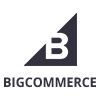
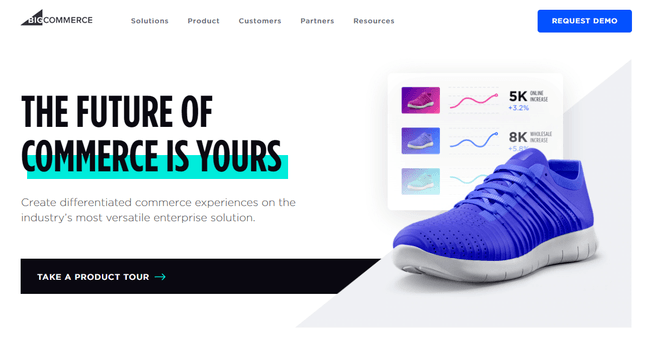
71 comments